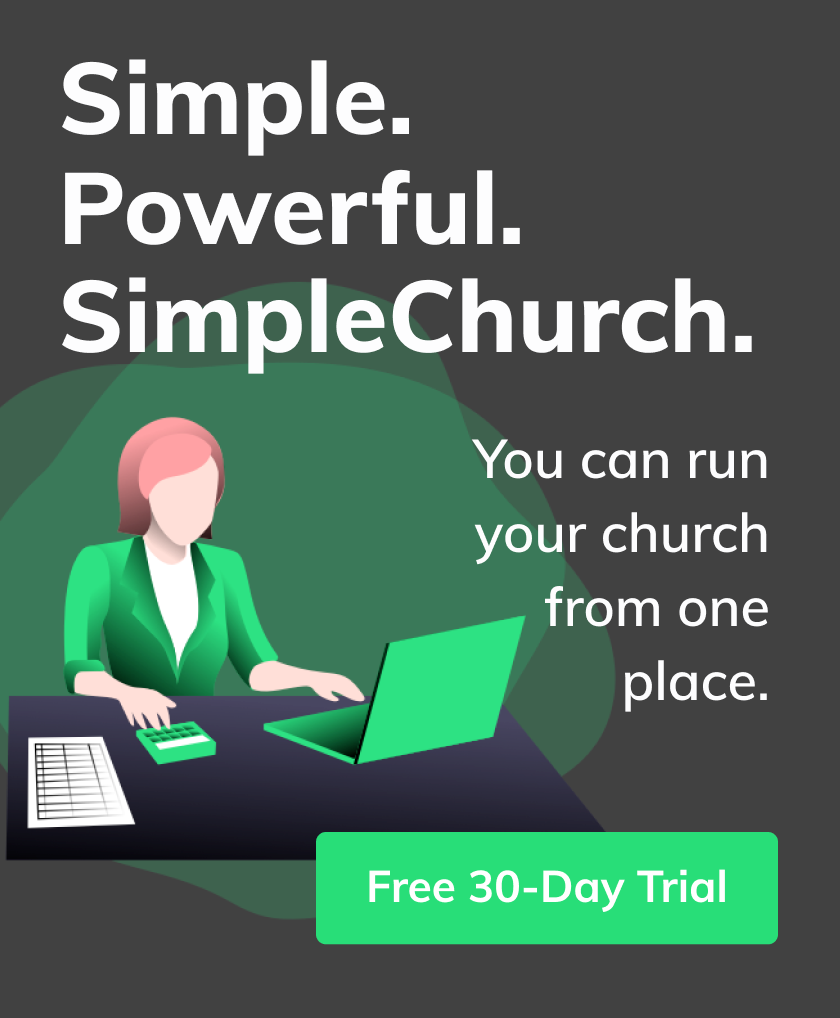Churches have unique accounting needs, and unfortunately, most regular business accounting software can’t handle those needs easily. Churches can get by using standard accounting packages like Quickbooks Online but using accounting software specifically designed for churches allows ministries like yours to manage your membership database and accept and track online donations—making the whole accounting process more manageable.
A report from Software Connect found that 29% of churches (nearly 1 in 3) buy new software because they are looking to replace an outdated system. So, whether you’re starting from scratch or needing to replace an ancient system that no longer keeps up with the latest trends and developments, keep reading to learn what to look for in today’s church accounting software.
What Is Church Accounting Software?
Church accounting software has all the features of regular accounting software, plus extra features specifically designed for churches. As you’d expect, it allows you to track tithes and donations, keep books balanced, create detailed reports of funded projects and ministries, pay vendors and staff, and more.
Good church accounting software should also be easy enough for anyone to use—no specialized training or certifications required. As The Balance reported, “Because most churches don’t have experienced accountants on staff, they need software that’s easy to use and set up, with the categories and types of transactions churches need to track.”
Church Accounting Software Should Include Everything You’d Expect
You shouldn’t have to compromise when selecting a church accounting software system. It should have everything you need in one package, including a ledger, payroll, receivables, payables, and reporting.
For instance, a True Fund Accounting system, which many churches prefer, might include features including:
- Ledger: The Ledger function helps you gain financial insight at a glance so that you can align your ministry goals. And you can set permissions for multiple users who need access to your church’s financial information, allowing them to see only the information they need to do their job.
- Payroll: Payroll processing is streamlined and automatically tracked in the general ledger. No special training is necessary as the system guides the user through a step-by-step Payroll system.
- Accounts Receivable: In Accounts Receivable, you can track invoices, payments, due dates, members, deposits, and more automatically. The Accounts Receivable section syncs to your central chart of accounts, providing an accurate picture of your true financial position.
- Accounts Payable: Accounts Payable allows you to safeguard your finances and track bills, vendors, budgets, deposits, and journal entries.
- Detailed Reporting: Preparing accurate financial reports can be stressful, especially if you’re not a CPA who knows precisely which reports are needed. Good church accounting software has easy-to-use reporting features that take the stress out of preparing financial statements for your members, donors, and church leadership.
Church Accounting Software Should Be Tailored Specifically for Ministries
In addition to the standard accounting software features you’ve come to expect, church accounting software should provide additional, powerful functionality specifically built for churches.
Church accounting software takes your standard package to the next level. For example, while managing all aspects of your Payroll system, you can include designations for clergy and lay staff. You can even print both Form 941 and W-2 with ease, supporting federal, state, and local tax requirements.
Accounts Payable allows you to pay bills and operate on a cash, accrual, or modified accrual basis. And with dedicated funds, projects, and built-in controls designed explicitly for ministries’ needs, you can ensure all donations end up in the appropriate account.
Accounts Receivable accurately track payments you receive for designated sources such as church daycare and school tuitions and make sure they are used for the purpose intended by the donor. And it tracks billing activity for the collection of insurance and pension.
Purchasing Management features allow you to create your own approval process that best benefits your church and streamlines your workflow. For example, you can create an approval process for purchases with a Purchase Order module that starts with a requisition and ends with an approved purchase order. In addition, the system will alert the appropriate staff member when a requisition has been filed and is awaiting approval and will even email the vendor the purchase order number once the requisition has been approved.
Standard monthly reports in church accounting software give you the information you need to share important financial information with church leaders and members. Each application has its own set of reports that auditors can use to reconcile sub-ledgers, ensuring your church meets all financial compliance guidelines.
Church Accounting Software Should Integrate with Your ChMS
Many churches have discovered the power of using a Church Management Software (ChMS) system. A strong ChMS provides churches with a robust set of features, including a member database, attendance tracker, online giving modules, children’s check-in features, and much more. When a church accounting software solution is seamlessly integrated with a ChMS, you get everything you need to run your ministry in a unified cloud-based platform. You’ll be able to connect transactions to members, produce insightful reports, and even allow users to print their own giving reports, so there’s no longer a scramble at the end of the year.
For instance, ShelbyNext Financials integrates the following user-friendly features into the SimpleChurch CRM:
- Payrolls, general ledger, accounts payable, bank account reconciliation, fixed assets, purchasing management, headquarter management, and more
- Streamlined cash flow management
- An easy-to-use, modern interface
- Secure access anytime, anywhere on any device
- Settings that allow you to choose which users receive visibly into specific funds, and set editing permissions based on the user’s role in your ministry
- Choice of cash, accrual, or modified accrual accounting methods
- GAAP compliance.
By bringing your ChMS and church accounting software together, you have everything you need, working together in one place.
Church Accounting Software Should Be Cloud Hosted
The Software Connect report also noted new trends in church accounting software. Specifically, churches increasingly prefer cloud-based installations over local installs of accounting software. One year, that preference increased 19%!
One reason users prefer cloud-based installations is because of two key benefits: 1) the data in cloud-based software is continually backed up to the cloud, and 2) it’s available anytime, anywhere, and on any device—PC, Mac, tablet, or even a phone—all through a familiar browser interface.
Accessibility is critical for churches that want to provide data to more church leaders, staff, volunteers, and members. With a cloud solution, you can give multiple users access to financial data, and you can control how much access each person has.
And here’s another benefit of a cloud-based church accounting software solution: real-time visibility and insights. You can stay on top of accounting and financial issues like program outcomes, revenue and expenses, cash trends, and more. Access to accurate information will make you better stewards of the donations and tithes contributed by your members.
With a cloud-based solution, you can also rest assured that sensitive donor information is kept private and secure. Your church can benefit from the investment in superior technology that major cloud providers have made.
Church Accounting Software Should Be Built for Your Success
When deciding on a church accounting software solution, inquire into what other trusted nonprofits, ministries, and churches use. And ensure that the software you’re considering has a world-class online and on-site support system.
Implementation should also be tailored for your church’s needs, size, and ministry objectives. Consider the following when making your choice:
- Who will use your church accounting software?
- What features do you need for the size of your ministry?
- Where will you be in five or ten years?
One of the most significant benefits of church accounting software is the time it frees up for you to focus on your ministry. Whether you’re looking for a new church accounting software system or replacing an outdated one, church accounting software will improve your processes and give you better insight into your giving and financial outlook.
Churches have unique financial needs, and you need a church accounting software designed just for you—one that will integrate with your ChMS, easily track donations and tithes, create payroll designations specifically for churches, and ensure compliance with local, state, and federal tax laws.




